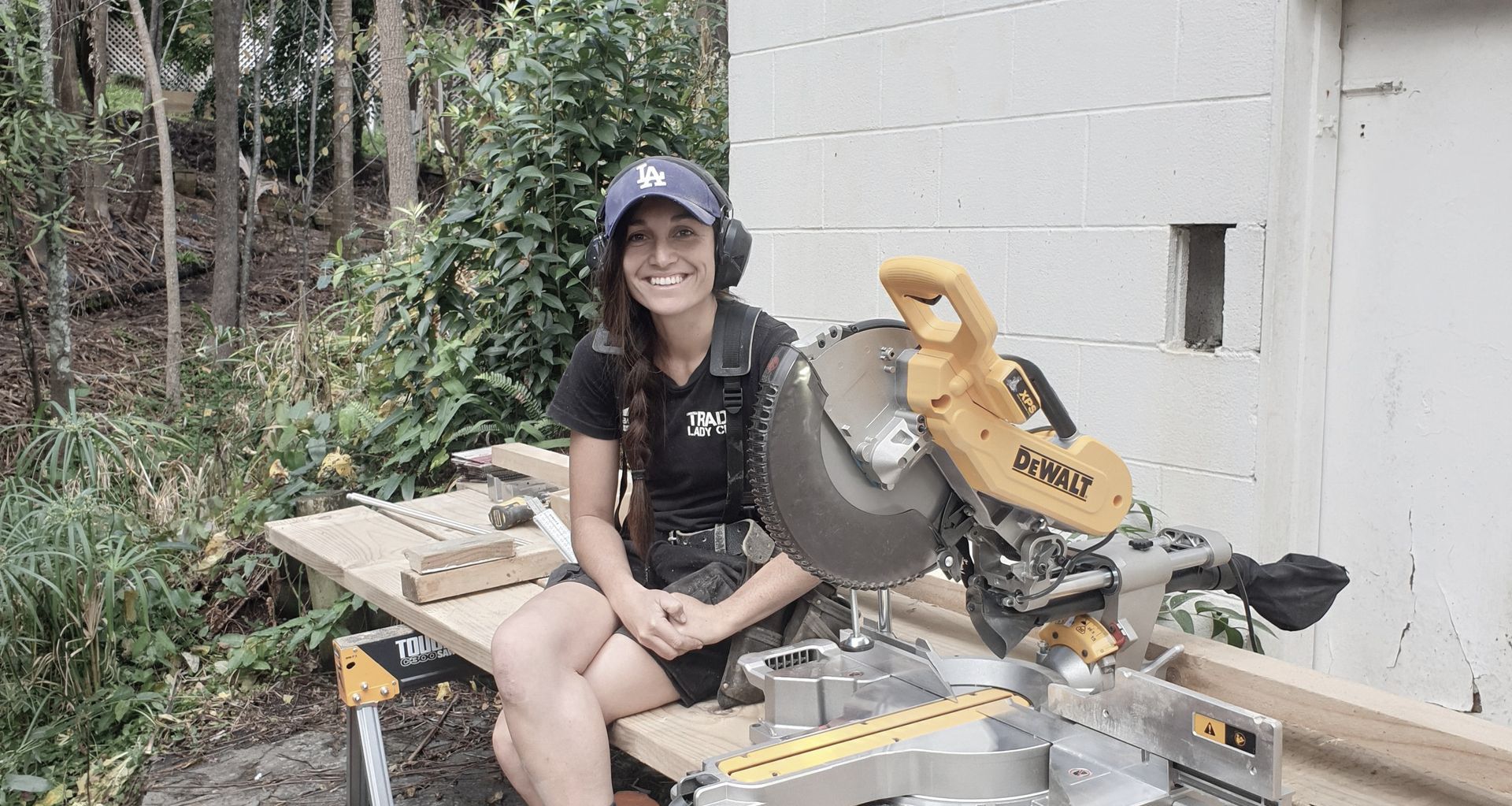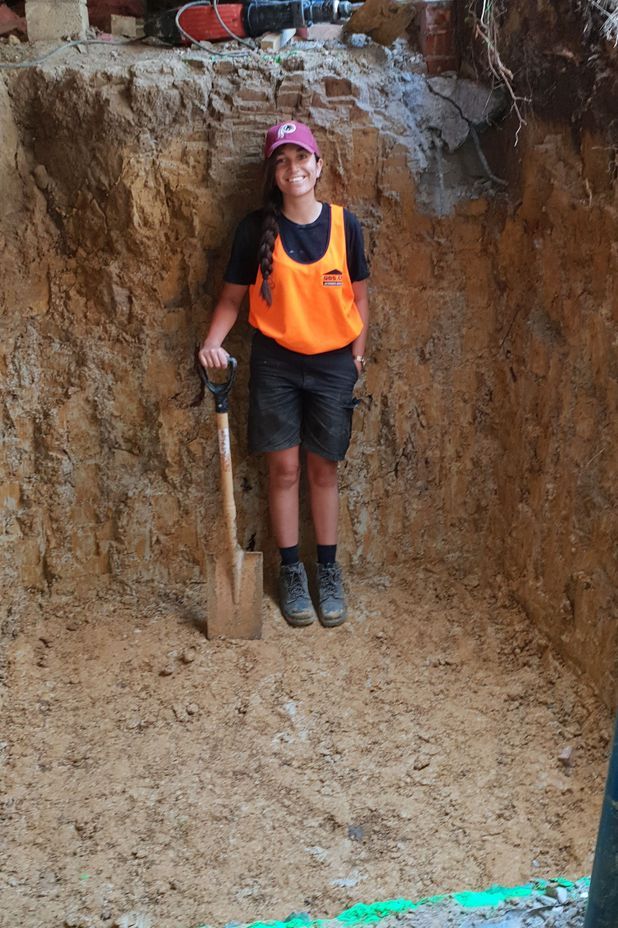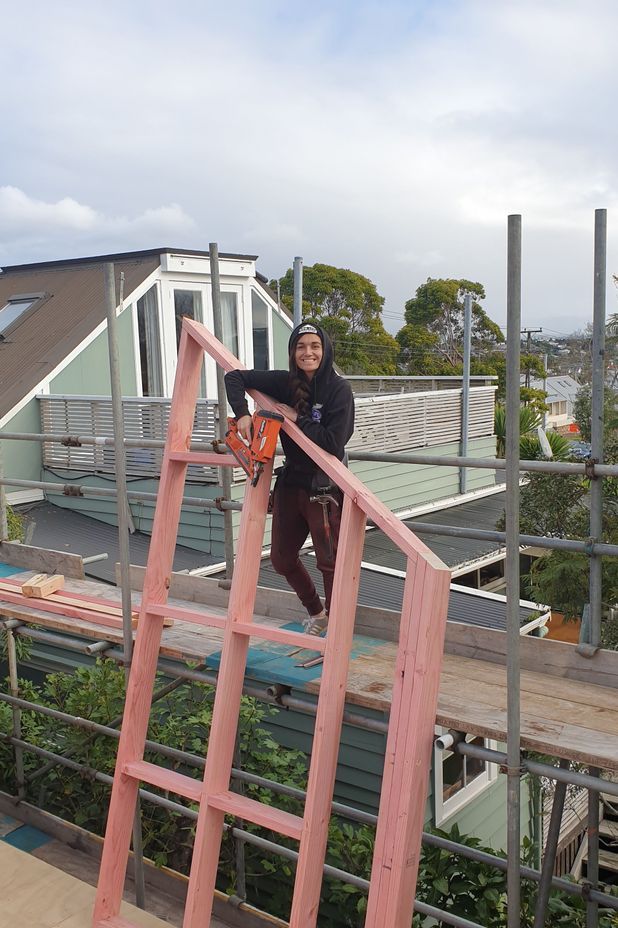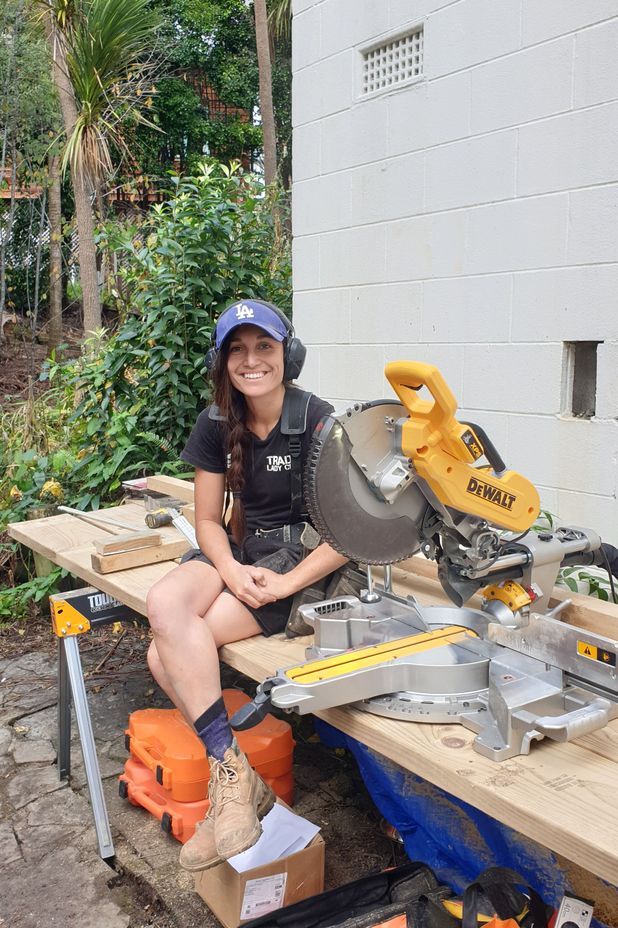Breaking barriers in the trades: Bex the builder
Written by
25 August 2021
•
7 min read

It was a chance offer that led Rebecca “Bex” Smith into a building apprenticeship. Three years ago she was immersed in a desk job promoting the Australian Football League (AFL) and co-ordinating New Zealand teams, but the industry wasn’t booming and she felt like she needed to activate a plan B.
“I wanted to get into project management—I like working with people, managing, timeline planning and organising. I thought I should probably get a fundamental understanding of how things work, how structures are built.”
It just so happened that her friend Troy Jury from QBS Construction was looking for a female apprentice to diversify his work force. But Bex wanted to know what he thought about females in the industry before committing to an apprenticeship.
“He said, ‘I don’t know if it’s ready for it, but totally go for it—it’s a great industry to be in and you’ve got thick skin, so you should be able to handle the worst that it could throw at you.’”
Bex didn’t have a family background in building, although she remembers helping her dad build their family home (“In the 1990s when you could do whatever you wanted!”), but her biggest concern was whether she was physically capable of performing the job.

“Troy said to me in my first interview, ‘If you can carry a sheet of Gib and a sheet of ply I’m happy. That’s the baseline standard. As for a massive shunt on something, or lifting something really heavy, you’re not really supposed to be doing that anyway… No-one should be maxing out and putting their back out to try and move something.’”
Comfortable that she had the strength needed to perform the role, Bex started her apprenticeship with the team at QBS Construction, working on new builds, renovations and small-scale commercial projects.
The male-dominated environment was nothing new to her, as she’d grown up with dad and two brothers, however, she says being the only female on site means she does stick out like a sore thumb.
“I always describe it as if you saw an elephant walk on site, you’d look at it, because elephants never come on site. It’s the same as having a female on site. It’s not very common, so people will look twice and I don’t take offence to it. Some people look very confused or a little bit like ‘Can I help you?’ I don’t hold it against them!”
The team of carpenters and builders she works with has been extremely supportive, but she says there was one encounter on site with a plumber subcontractor that wasn’t as positive.
“I was doing all the heavy lifting and the other guy who is a lot stronger, a lot bigger than me was doing the easy job. The plumber was like ‘What kind of show is this? What’s she doing that job for when you’re over here?' In a way I think he was trying to stick up for me, or trying to say [my workmate was] more capable so [he] should be doing that job. But my workmate was like, ‘No, she can do it. She’s the apprentice. That’s the rule here, I do the thinking, she does the labour.’”
While Bex says the plumber's reaction is the exception rather than the rule, it did make her feel he thought she wasn’t as capable as her colleague.

But Bex doesn't think it's necessarily her gender that prompted the reaction; her stature and strength are a constant challenge.
“It’s not necessarily a female thing, it’s just that I'm small! There’s girls out there that can lift double what some of the dudes at work can.
“I’m working at 110% a lot of the time. So on average, when we’re unloading the truck, you probably need to take two sticks of 4x2. Three sticks if you’re trying to be tough. I can take three sticks—that’s me at about 80%, but for the guys that’s them at 40%.”
Bex has noticed there are disadvantages to being a male on a building site too, and it comes down to the same stereotyping that can be as toxic for males as it is for females.
“I don’t need to prove my manhood, I don’t have to prove my strength, because everyone knows I’m Bex and I’m small. I can see some of the younger guys feel like they need to keep up with the experienced, massive guys—it’s that toxic masculinity of having to show how big and strong and tough they are.”
Now in the third year of her apprenticeship, Bex is seeing more female faces pop up around the place. She says women have an unspoken bond on site and often acknowledge each other with a knowing smile and an eyebrow raise.
She believes the industry is receptive to more female tradies and it’s just a matter of time before it’s normalised.
However, not all trades are equal in terms of physicality, so for anyone entering the trades, she says it pays to understand what you’re getting into.
“It’s not all sunshine and rainbows. That’s nothing to do with being a woman— just the job, being a builder...Most trades are physical, so if you don’t enjoy breaking a sweat…”

She can do it, she’s the apprentice—that’s the rule here, I do the thinking, she does the labour
Bex predicts that by early next year she’ll have completed her apprenticeship, and she has goals she wants to achieve. These include building her own home and hopefully starting a family in the next couple of years. It will be unknown territory for both her and her employer.
“I don’t know what building will look like pregnant. That’s a conversation for me and my boss to have because there’s no blueprint for it. The women I know who have been pregnant on the tools, they’ve worked until 36 weeks...
“[Then] there’s health and safety for the baby; you could wear all of the PPE in the world, but I still probably wouldn't feel comfortable around asbestos, silica dust, all of those things, even if I was all covered up. That’s a personal choice.”
But planning for all eventualities is Bex’ strong suit and the diploma she has started in construction management will mean that she can take some time off the tools and go back to her love of timelines and organising projects.
That feeds into another goal she has planned for the next five to 10 years, which is to start a building company with her partner, bringing his civil project management knowledge together with her building experience.
This move will bring her full circle, as she plans to hire her own female apprentice, offering another aspiring female builder the same opportunity that once landed in her lap.
“I really like to push girls getting into the trades because I know how unsure I was. Any career change is scary, but it was nowhere near as daunting as I thought it was going to be!”